Cartier (jeweler)
Cartier International SNC, or simply Cartier (/ˈkɑːrtieɪ/; French: [kaʁtje]), is a French luxury goods conglomerate which designs, manufactures, distributes, and sells jewellery and watches.[2][3][4] Founded by Louis-François Cartier in Paris in 1847, the company remained under family control until 1964.[4] The company maintains its headquarters in Paris, although it is a wholly owned subsidiary of the Swiss Richemont Group.[5][6] Cartier operates more than 200 stores in 125 countries, with three Temples (Historical Maison) in London, New York, and Paris.[6][7]
 | |
| Subsidiary | |
| Industry |
|
| Founded | 1847 |
| Founder | Louis-François Cartier |
| Headquarters | , France |
Area served | Worldwide |
Key people | Cyrille Vigneron, CEO |
| Products | Jewellery, watches |
| Revenue | |
| Parent | Richemont |
| Website | cartier |
Cartier is regarded as one of the most prestigious jewellery manufacturers in the world.[4][8][9][10][11][12] In 2018, it is ranked by Forbes as the world's 59th most valuable brand.[13] Cartier has a long history of sales to royalty.[14] King Edward VII of Great Britain referred to Cartier as "the jeweller of kings and the king of jewellers."[4][15] For his coronation in 1902, Edward VII ordered 27 tiaras and issued a royal warrant to Cartier in 1904.[4][16] Similar warrants soon followed from the courts of Spain, Portugal, Russia, the House of Orleans, and so on.
History
Early history
Louis-François Cartier founded Cartier in Paris, France in 1847 when he took over the workshop of his master, Adolphe Picard.[17] In 1874, Louis-François' son Alfred Cartier took over the company, but it was Alfred's sons Louis, Pierre and Jacques who established the brand name worldwide.[17]
.jpg)
Louis ran the Paris branch, moving to the Rue de la Paix in 1899. He was responsible for some of the company's most celebrated designs, like the mystery clocks (a type of clock with a transparent dial and so named because its mechanism is hidden[18]), fashionable wristwatches and exotic orientalist Art Deco designs, including the colorful "Tutti Frutti" jewels.[19][20]
In 1904, the Brazilian pioneer aviator, Alberto Santos-Dumont complained to his friend Louis Cartier of the unreliability and impracticality of using pocket watches while flying. Cartier designed a flat wristwatch with a distinctive square bezel. This watch was favored not only by Santos-Dumont himself but also by many other customers.[21] The "Santos" watch was Cartier's first men's wristwatch. In 1907, Cartier signed a contract with Edmond Jaeger, who agreed to exclusively supply the movements for Cartier watches.[22] Among the Cartier team was Charles Jacqueau, who joined Louis Cartier in 1909 for the rest of his life, and Jeanne Toussaint, who was Director of Fine Jewellery from 1933.
On the other hand, Pierre Cartier established the New York City branch in 1909, moving in 1917 to 653 Fifth Avenue, the Neo-Renaissance mansion of Morton Freeman Plant (son of railroad tycoon Henry B. Plant) and designed by architect C.P.H. Gilbert.[23] Cartier bought it from the Plants in exchange for $100 in cash and a double-stranded natural pearl necklace valued at the time at $1 million.[24] By this time, Cartier had branches in London, New York and St. Petersburg and was quickly becoming one of the most successful watch companies in the world.[11][3]
Designed by Louis Cartier, the Tank watch model was introduced in 1919 with a design inspired by the newly introduced tanks on the Western Front in World War I.[17] In the early 1920s, Cartier formed a joint-stock company with Edward Jaeger (of Jaeger-LeCoultre) to produce movements solely for Cartier. Cartier continued to use movements from other makers: Vacheron Constantin, Audemars Piguet, Movado and LeCoultre. It was also during this period that Cartier began adding its own reference numbers to the watches it sold, usually by stamping a four-digit code on the underside of a lug. Jacques took charge of the London operation and eventually moved to the current address at New Bond Street.
Re-organization
After the death of Pierre in 1964, Jean-Jacques Cartier (Jacques's son), Claude Cartier (Louis's son), and Marionne Claudelle (Pierre's daughter) — who respectively headed the Cartier affiliates in London, New York and Paris — sold the businesses.
In 1972, Robert Hocq, assisted by a group of investors led by Joseph Kanoui, bought Cartier Paris.[25] In 1974 and 1976, respectively, the group repurchased Cartier London and Cartier New York, thus re-connecting Cartier worldwide.[25] The new president of Cartier, Robert Hocq, created the phrase "Les Must de Cartier" (a staff member is said to have said "Cartier, It's a must!" meaning something one simply must have) with Alain Dominique Perrin, who was a General Director of the company.[26][27] As a result, in 1976, "Les Must de Cartier" became a low-priced spin-off line of Cartier, with Alain D. Perrin being its CEO.[28][29][30]
In 1979, the Cartier interests were combined, with Cartier Monde uniting and controlling Cartier Paris, London and New York. Joseph Kanoui became vice president of Cartier Monde. In December 1979, following the accidental death of president Robert Hocq, Nathalie Hocq, the daughter of Robert Hocq, became the president.[25][30]
Recent development
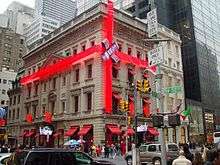
In 1981, Alain Dominique Perrin was appointed Chairman of Cartier SAA and Cartier International.[27][29] The next year, Micheline Kanoui, the wife of Joseph Kanoui, became head of jewellery design and launched her first collection "Nouvelle Joaillerie".[28] In 1984, Perrin founded the Fondation Cartier pour l'Art Contemporain to bring Cartier into the twenty-first century, by forming an association with living artists. In 1986, the French Ministry for Culture appointed Perrin head of the "Mission sur le mécénat d'entreprise" (a commission to study business patronage of the arts). Two years later, Cartier gained a majority holding in Piaget and Baume & Mercier. In 1989/1990 the Musée du Petit Palais staged an exhibition of the Cartier collection, "l'Art de Cartier".[31]
Perrin founded an international committee in 1991, Comité International de la Haute Horlogerie, to organize its first salon, held on 15 April 1991. This has become an annual meeting place in Geneva for professionals. The next year, the second exhibition of "l'Art de Cartier" was held at the Hermitage Museum in St Petersburg. In 1993, the "Vendôme Luxury Group" was formed as an umbrella company to combine Cartier, Dunhill, Montblanc, Piaget, Baume & Mercier, Karl Lagerfeld, Chloé, Sulka, Hackett, and Seeger.[32]
In 1994, the Cartier Foundation moved to the Rive Gauche and opened headquarters in a building designed for it by Jean Nouvel. The next year, a major exhibition of the Cartier Antique Collection was held in Asia. In 1996, the Lausanne Hermitage Foundation in Switzerland exhibited "Splendours of the Jewellery", presenting a hundred and fifty years of products by Cartier.[33]
In 2012, Cartier was owned, through Richemont, by the South African Rupert family, and Elle Pagels, a 24-year-old granddaughter of Pierre Cartier.[34][35]
Managing directors
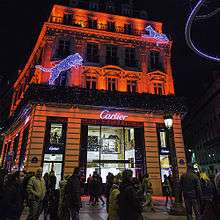
- Laurent E. Feniou - (25 March 2013 – present).[36]
- Rupert J. Brooks - (16 December 2015 – present).[37]
- Francois M. J. R. Le Troquer - (1 September 2010 - 28 March 2013).[38]
- Bernard M. Fornas - (21 January 2003 - 16 December 2015).[39]
- Guy J. Leymarie - (2 September 2002 - 28 October 2002).[40]
- Grieg O. Catto - (2 April - present).[41]
- Denys E. Pasche - (2 April 2002 - 17 July 2002).[42]
- David W. Merriman - (2 April 2002 - 17 July 2002).[43]
- Richard P. Lepeu - (1 November 2000 - 1 April 2002).[44]
- Sophie Cagnard - (1 November 2000 - 1 April 2002).[45]
- Gerard S. Djaoui - (12 June 1997 - 1 April 2002).[46]
- Francois Meffre - (11 June 1993 - 28 September 2000).[47]
- Richard N. Thornby - (11 June 1993 - 7 October 1996).[48]
- Luigi Blank - (11 June 1993 - 1 April 2002).[49]
- Joseph W. Allgood - (22 June 1992 - 8 April 1993).[50]
- Arnaud M. Bamberger - (4 June 1992 - 16 December 2015).[51]
- Mario Soares - (22 June 1991 - 5 March 2002).[52]
- Joseph Kanoui - (22 June 1991 - 31 January 2000).[53]
- William A. Craddock - (22 June 1991 - 31 October 1997).[54]
- Christopher H. B. Honeyborne - (22 June 1991 - 31 October 1997).[55]
- Pierre Haquet - (22 June 1991 - 8 April 1993).[56]
- Phillipe Leopold-Metzger - (22 June 1991 - 4 June 1992).[57]
Jewelry and watch manufacturing
.jpg)
Notable products
- 1911 - Launch of Santos de Cartier wristwatch.[3]
- 1918 - Creation of batons for Field-Marshals Foch and Pétain.
- 1919 - Launch of the Tank watch.[3]
- 1921 - Creation of the Tank cintrée watch.
- 1922 - Creation of the Tank Louis Cartier and Tank Chinoise watches.
- 1923 - Creation of the first portico mystery clock, crowned with a statuette called Billiken.
- 1926 - Creation of the Baguette watch. Cartier jewellery in its red box appeared on the Broadway stage in Anita Loos' play Gentlemen Prefer Blondes.
- 1928 - Creation of the Tortue single pushpiece chronograph watch.[3]
- 1929 - Creation of the Tank à guichets watch.
- 1931 - Creation of the mystery pocket watch.
- 1932 - Creation of the Tank basculante watch.
- 1933 - Cartier filed a patent for the "invisible mount", a stone-setting technique in which the metal of the mount disappears to show only the stones.
- 1936 - Creation of the Tank asymétrique watch.
- 1942 - Creation of the "Caged Bird" brooch as a symbol of the Occupation.[3]
- 1944 - Cartier created the "Freed Bird" to celebrate the Liberation of France.
- 1950 - Creation of a watch in the form of a ship's wheel.
- 1967 - Creation of new watches in London including the Crashwatch.
- 1968 - Creation of the Maxi Oval watch.
- 1969 - Creation of the Love bracelet.[3]
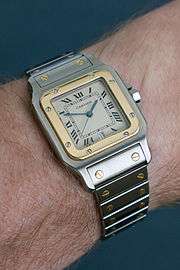 Cartier Santos - steel/gold from 1988
Cartier Santos - steel/gold from 1988 - 1973 - Creation of Les Must de Cartier by Robert Hocq with Alain-Dominique Perrin.[3]
- 1974 - Launch of the first leather collection in burgundy.
- 1976 - First collection of Les Must de Cartier vermeil watches. Creation of the first oval pen.
- 1978 - Creation of the Santos de Cartier watch with a gold and steel bracelet. Creation of the first Cartier scarf collection.[3]
- 1981 - Launch of the Must de Cartier and Santos de Cartier perfumes.
- 1982 - Launch of the first New Jewellery collection on the theme of gold and stones.
- 1983 - Creation of the Collection Ancienne Cartier (later the Cartier Collection) to record and illustrate how the jeweller's art and its history have evolved. Creation of the Panthère de Cartier watch.
- 1984 - Launch of the second New Jewellery collection on the theme of gold and pearls. Creation of the Fondation Cartier pour l'Art Contemporain in Jouy-en-Josas.
- 1985 - Launch of the Pasha de Cartier watch.[3]
- 1986 - Launch of the third New Jewellery collection on the theme of the panther.
- 1987 - Launch of the Panthère de Cartier perfume. Creation of Les Maisons de Cartier tableware (porcelain, crystal and silver).
- 1988 - Launch of the fourth New Jewellery collection on the theme of Egypt.
- 1989 - Launch of the Tank Américaine watch. The Art of Cartier, the first major retrospective in Paris, was held at the Petit Palais.
- 1995 - Creation of the Pasha C watch in steel. Launch of the So Pretty de Cartier perfume.
- 1996 - Creation of the Tank Française watch collection. Launch of the sixth New Jewellery collection on the theme of Creation. Creation of the Tank ring.[3]
- 1997 - Cartier celebrated its 150th anniversary with creations including a necklace in the form of a serpent, paved with diamonds and set with two pear-cut emeralds of 205 and 206 carats (41.2 g).[3]
- 1998 - Creation of the Collection Privée Cartier Paris Fine Watch collection.
- 1999 - Creation of the Paris Nouvelle Vague Cartier jewellery collection, inspired by Paris.
- 2001 - Creation of the Délices de Cartier jewellery collection. Launch of the Roadster watch.[3]
- 2002 - Creation of the Tank Divan watch.
- 2003 - Launch of the Le Baiser du Dragon and Les Délices de Goa jewellery collections.
- 2007 - Launch of Ballon Bleu de Cartier watch.[3]
Environmental rating
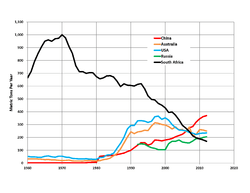
In December 2018, World Wide Fund for Nature (WWF) released an official report giving environmental ratings for 15 major watch manufacturers and jewelers in Switzerland.[58][59] Cartier (being a subsidiary of the Swiss Richemont Group) was ranked No. 2 among the 15 manufacturers and, along with 3 other manufacturers including Vacheron Constantin and Jaeger-LeCoultre, was given an average environmental rating as "Upper Midfield", suggesting that the manufacturer has taken first actions addressing the impact of its manufacturing activities on the environment and climate change.[58] According to Cartier's official company document, the company is committed to conduct businesses "in an environmentally responsible manner" and "minimising negative environmental impacts".[60]
In jewelry and watchmaking industry, there are general concerns over the lack of transparency in manufacturing activities and the sourcing of precious raw materials such as gold, which is a major cause of environmental issues such as pollution, soil degradation and deforestation.[58][59] The situation is especially serious in the developing countries which are top producers of gold, including China, Russia and South Africa.[61][62][63][64] It is estimated that the watch and jewelry sector uses over 50% of world's annual gold production (over 2,000 tons), but in most cases the watch companies are not able to or are unwilling to demonstrate where their raw materials come from and if the material suppliers use eco-friendly sourcing technologies.[58]
Notable patrons and owners
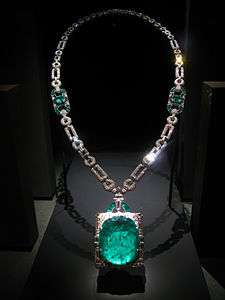
Celebrities
- 1928 - Marjorie Merriweather Post bought from Cartier in London earrings once worn by Queen Marie-Antoinette of France.
- 1950 - The Hollywood actress Gloria Swanson appeared in Sunset Boulevard wearing the two diamond and rock crystal bracelets that she had bought from Cartier in 1930.
- 1955 - Creation of Jean Cocteau's sword for his election to the Académie française, to the artist's own design.[3]
- 1957 - Barbara Hutton bought a tiger brooch in yellow gold, onyx and jonquil diamonds.
- 1968 - The Mexican actress María Félix commissioned Cartier to make a diamond necklace in the form of a serpent.[3]
- 1969 - Robert Kenmore, the chairman of Cartier's parent company, acquired a 69.42-carat (13.884 g) pear-shaped diamond which it sold to Richard Burton and Elizabeth Taylor. The Cartier Diamond was thus renamed the Taylor-Burton Diamond.[3]
Royalty
- 1904 - Cartier received its first appointment as official purveyor to King Edward VII of the United Kingdom.[3]
- 1904 - Cartier received another appointment as the purveyor for King Alfonso XIII of Spain.[65]
- 1907 - Cartier held its first exhibition and sale in Saint Petersburg, at the Grand Hotel Europe. Shortly after, it was appointed as official purveyor to Tsar Nicholas II of Russia.[66]
- 1919 - Appointment as official purveyor to King Albert I of Belgium.
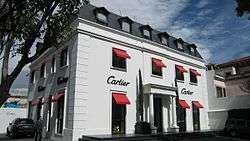 Cartier on Mexico City's Avenida Presidente Masaryk
Cartier on Mexico City's Avenida Presidente Masaryk - 1921 - Appointment as official purveyor to the Prince of Wales, future King Edward VIII who, on abdicating in 1936, became the Duke of Windsor.
- 1924 - Queen Marie of Romania wears a Cartier tiara created to resemble the Russian kokoshnik for her portrait painted by Philip de László.
- 1925 - Maharaja of Patiala commissions the Patiala Necklace
- 1929 - Appointment as official purveyor to King Fouad I of Egypt.
- 1938 - One of the smallest wristwatches in the world, by Cartier, was given to Princess Elizabeth of the United Kingdom.[3]
- 1939 - Appointment as official purveyor to King Zog I of Albania.
- 1949 - The Duke and Duchess of Windsor bought a platinum panther brooch on a 152.35-carat (30.470 g) Kashmir cabochon sapphire in Paris.[3]
- 1954 - Creation for the Duchess of Windsor of a lorgnette in yellow gold, black enamel and emeralds representing a tiger.
- 1956 - For her marriage to Prince Rainier, Princess Grace received numerous gifts of jewellery by Cartier including her engagement ring, set with a 12-carat (2.4 g) emerald-cut diamond.
- 2014 - Kate Middleton, the Duchess of Cambridge, has been seen wearing the Cartier Ballon Bleu watch.[67]
See also
- List of watch manufacturers
- Fondation Cartier pour l'Art Contemporain
- Cartier Women's Initiative Awards
- Cartier Racing Awards
- Cartier Tank watch
- Cartier Love bracelet
References
- "Cartier on the Forbes World's Most Valuable Brands List". Archived from the original on 2017-08-08.
- "Company Overview of CARTIER International SNC". www.bloomberg.com. Retrieved 2019-02-02.
- "Brand - Fondation de la Haute Horlogerie". www.hautehorlogerie.org. Retrieved 2019-01-20.
- "Cartier". Sotheby's. Retrieved 2019-01-20.
- "Compagnie Financière Richemont SA - Home". www.richemont.com. Retrieved 2019-01-20.
- "Cartier Monde - Company Profile, Information, Business Description, History, Background Information on Cartier Monde". www.referenceforbusiness.com. Retrieved 2019-02-02.
- "Beyond a Boutique: The Story behind the Transformation of Cartier's "Temple" in London – Luxe.CO". Retrieved 2019-02-02.
- "Cartier jewels - An expert guide | Christie's". www.christies.com. Retrieved 2019-01-20.
- "A Guide to Cartier: The Birth of a Luxury Jewelry Magnate". Invaluable. Retrieved 2019-01-20.
- "Cartier". Interbrand. Retrieved 2019-01-20.
- "Cartier - Fondation de la Haute Horlogerie". www.hautehorlogerie.org. Retrieved 2019-01-20.
- Pitt, Martyn R.; Koufopoulos, Dimitrios (2012-03-28). Essentials of Strategic Management. SAGE. ISBN 9781446290774.
- "Cartier on the Forbes World's Most Valuable Brands List". Forbes. Retrieved 2019-01-20.
- Menkes, Suzy (2006-01-10). "A ball for the 'king of jewellers'". The New York Times. Archived from the original on 2014-07-17. Retrieved 2012-03-14.
A line-up of small rooms for special clients has original light oak wood paneling carved with garlands and hung with certificates from England's Edward VII, (in 1905) through the king of Siam and Russian czars.
- Prat, Véronique (2009-08-28). "Les joyaux de Cartier exposés dans la Cité interdite" [Cartier jewels set in the Forbidden City] (in French). Archived from the original on 2014-02-19. Retrieved 2012-03-14.
- "Rock star". Time. 2004-09-14. Archived from the original on 2012-03-13. Retrieved 2012-03-14.
- "History - Fondation de la Haute Horlogerie". www.hautehorlogerie.org. Retrieved 2019-02-02.
- "Roger Russell's Mystery Clock History Page". Archived from the original on 2004-06-05. Retrieved 2008-03-09.
- "Cartier's Secrets of Mystery Clocks". The New York Times. 1981-03-26. ISSN 0362-4331. Retrieved 2019-01-20.
- "Historic Mystery Clocks Of Cartier Unveiled". AUGUSTMAN.com. Retrieved 2019-01-20.
- "History of the Pilot Watch Part I – Cartier Santos 1904". Archived from the original on 2014-10-06. Retrieved 2014-10-01.
- Nadelhoffer, Hans (2007-10-18). Cartier. Chronicle Books. ISBN 9780811860994. Archived from the original on 2017-09-29.
- Mun-Delsalle, Y.-Jean. "Cartier's Mansion On Fifth Avenue Underwent Its Biggest Revamp Ever Just In Time For Its Centenary". Forbes. Retrieved 2019-02-02.
- Dunlap, David (2000-04-26). "Commercial Real Estate; Cartier Spruces Up to Show Off Its Jewels in Style". New York Times. Retrieved 2008-03-09.
- Jr, George Goodman (1979-12-10). "Robert Hocq, Cartier Executive, Is Killed by Automobile in Paris". The New York Times. ISSN 0362-4331. Retrieved 2019-02-02.
- Friedman, Jane (1979-12-02). "The First Lady of Cartier". The New York Times. ISSN 0362-4331. Retrieved 2019-02-02.
- Cuff, Daniel F. (1988-04-28). "BUSINESS PEOPLE; Cartier Head Nearing $1 Billion Sales Goal". The New York Times. ISSN 0362-4331. Retrieved 2019-02-02.
- "History of Cartier Monde – FundingUniverse". www.fundinguniverse.com. Retrieved 2019-02-02.
- "Alan Dominique Perrin interview". www.wineanorak.com. Retrieved 2019-02-02.
- "CARTIER". Washington Post. 1983-05-13. ISSN 0190-8286. Retrieved 2019-02-02.
- "Petit Palais Museum Website". Archived from the original on October 20, 2016. Retrieved October 19, 2016.
- "Vendôme Luxury Group plc History". Funding Universe. Archived from the original on 2012-07-31. Retrieved 2013-02-26.
- Alford, Holly Price; Stegemeyer, Anne (2014-09-25). Who's Who in Fashion. Bloomsbury Publishing USA. ISBN 9781609019693. Archived from the original on 2017-10-04.
- "Johann Rupert & family". Forbes. Retrieved 2019-02-02.
- "The Spirit of Maison Cartier - Estate Jewelry". www.lj24magazine.com. Retrieved 2019-02-02.
- "Laurent Eugene FENIOU - Personal Appointments (free information from Companies House)". Archived from the original on 2016-10-26.
- "Rupert John BROOKS - Personal Appointments (free information from Companies House)". Archived from the original on 2016-10-26.
- "Francois Le Troquer". Archived from the original on 2016-10-26.
- "Bernard Marie FORNAS - Personal Appointments (free information from Companies House)". Archived from the original on 2016-10-26.
- "Guy Jeremie LEYMARIE - Personal Appointments (free information from Companies House)". Archived from the original on 2016-10-26.
- "Greig Owen CATTO - Personal Appointments (free information from Companies House)". Archived from the original on 2016-10-26.
- "Denys Edward PASCHE - Personal Appointments (free information from Companies House)". Archived from the original on 2016-10-26.
- "David Wyndham MERRIMAN - Personal Appointments (free information from Companies House)". Archived from the original on 2016-10-26.
- "Richard Philippe LEPEU - Personal Appointments (free information from Companies House)". Archived from the original on 2016-10-26.
- "Sophie CAGNARD - Personal Appointments (free information from Companies House)". Archived from the original on 2016-10-26.
- "Gerard Salomon DJAOUI - Personal Appointments (free information from Companies House)". Archived from the original on 2016-10-26.
- "Francois MEFFRE - Personal Appointments (free information from Companies House)". Archived from the original on 2016-10-26.
- "Richard Neil THORBY - Personal Appointments (free information from Companies House)". Archived from the original on 2016-10-26.
- "Luigi BLANK - Personal Appointments (free information from Companies House)". Archived from the original on 2016-10-26.
- "Joseph William ALLGOOD - Personal Appointments (free information from Companies House)". Archived from the original on 2016-10-26.
- "Arnaud Marie BAMBERGER - Personal Appointments (free information from Companies House)". Archived from the original on 2016-10-26.
- "Mario SOARES - Personal Appointments (free information from Companies House)". Archived from the original on 2016-10-26.
- "Joseph KANOUI - Personal Appointments (free information from Companies House)". Archived from the original on 2016-10-26.
- "William Aleck CRADDOCK - Personal Appointments (free information from Companies House)". Archived from the original on 2016-10-26.
- "Christopher Henry Bruce HONEYBORNE - Personal Appointments (free information from Companies House)". Archived from the original on 2016-10-26.
- "Pierre HAQUET - Personal Appointments (free information from Companies House)". Archived from the original on 2016-10-26.
- "Philippe LEOPOLD-METZGER - Personal Appointments (free information from Companies House)". Archived from the original on 2016-10-26.
- "Environmental rating and industry report 2018" (PDF). World Wide Fund for Nature. Retrieved 2019-01-19.
- swissinfo.ch, S. W. I.; Corporation, a branch of the Swiss Broadcasting. "Swiss luxury watches fail to meet environmental standards". SWI swissinfo.ch. Retrieved 2019-01-19.
- "CORPORATE RESPONSIBILITY POLICY" (PDF). Cartier. Retrieved 2018-01-21.
- Vidal, John; Guest, graphic by Pete (2015-08-15). "How developing countries are paying a high price for the global mineral boom". The Observer. ISSN 0029-7712. Retrieved 2019-02-02.
- "China needs to get to grips with its gold mining pollution crisis". www.chinadialogue.net. Retrieved 2019-02-02.
- Einhorn, Dom (2015-02-09). "Mining in Russia: An economic boost or an environmental threat?". Born2Invest. Retrieved 2019-02-02.
- "South Africa has failed to protect locals from gold mine pollution: Harvard report". MINING.com. 2016-10-12. Retrieved 2019-02-02.
- Gryffindor (2 October 2010). "English: Coat of arms of the monarchies to whom Cartier is/was the royal or imperial purveyor. Taken outside the Cartier house on Fifth Avenue in New York City. It showes us the coat of arms of the royal family of Spain". Archived from the original on 10 November 2012 – via Wikimedia Commons.
- Gryffindor (2 October 2010). "English: Coat of arms of the monarchies to whom Cartier is/was the royal or imperial purveyor. Taken outside the Cartier house on Fifth Avenue in New York City. This is the Imperial Russian coat of arms". Archived from the original on 10 November 2012 – via Wikimedia Commons.
- Adams, Ariel. "Kate Middleton Wears Cartier Ballon Bleu Watch". Archived from the original on 2016-09-06. Retrieved 2016-08-31.
Further reading
- Liu, Ming (September 19, 2017). "At 100, the Cartier Tank Transcends Time". The New York Times. ISSN 0362-4331.
- Francesca Cartier Brickell (2019). The Cartiers: The Untold Story of the Family Behind the Jewelry Empire. Ballantine Books. ISBN 978-0525621614.